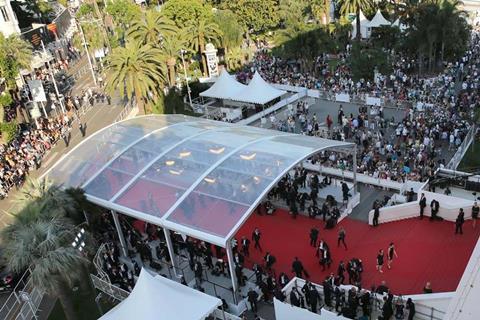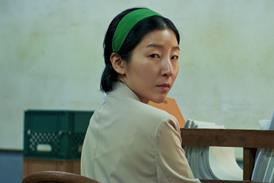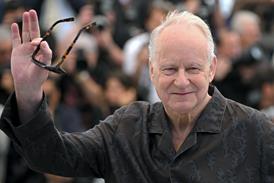
Cannes Film Festival chief Thierry Frémaux’s recent comments that he wants to align its first press screenings with the red carpet premieres, rather than running them before, has reignited a long-running debate in the film industry.
Frémaux told Screen last week that such a move could re-energise the red carpet as an event and also save film-makers from the trauma of ascending the steps of the Palais du Cinéma in the wake of a negative press screening.
The number of journalists attending Cannes has risen steadily over its 70-year history hitting 4,179 in 2017, against 700 in 1966 when records began, according to the festival’s own statistics.
This rising media presence combined with the speed at which reviews and opinions on a Palme d’Or contender go online soon after a press screening ends means the buzz around a film is often sealed hours before the director and cast even hit the red carpet.
Frémaux hopes his proposed change to the timing of press screenings – currently mainly taking place at 8.30am, for an evening red carpet, and 7.30pm, for a film screening the next day – will add fresh weight to the official screening.
The idea is not new. A number of Cannes habitués, particularly from the production and distribution side of the film chain, have been calling for such a move for years, particularly since the proliferation of social media.
But the festival chief – who also addressed the idea in his recent book Sélection Officielle - seems more determined than ever to put the suggestion on the table.
Screen has canvassed a selection of Cannes regulars – from producers and sales agents through to film PRs and journalists – on their views on the proposed change.
Producers
Not surprisingly, most of the producers contacted said they would be in favour of simultaneous screenings.
French producer Charles Gillibert recalled how the premiere of Olivier Assayas’s Personal Shopper in 2016 was overshadowed by reports that there had been whistles during the first press screening.
“A group of French bloggers from the same group “whistled” during one of the scenes. This information was tweeted during the screening and went on to trend on Twitter and become a top Google search,” he recounted.
“Most of the big Anglo-Saxon broadsheets went on to praise the film but all that anyone could remember was that the film had been whistled at by journalists in Cannes during the press screening.”
“Journalists play a vital role for cinema and I don’t think their status or the quality of their work is being brought into question by a potential alignment of the screenings… but at the same time it’s not that difficult to get into a press screening and spread a damaging rumour so I’m not surprised that Cannes’ organisers are asking themselves questions about how to protect the filmmakers,” he adds.
Compatriot producer Florence Gastaud, who attended Cannes with Michel Hazanavicius’s Palme d’Or contender Redoubtable, echoed Gillibert’s sentiments.
“Over the years, the morning press screening at Cannes has progressively gained more and more importance and what comes out of it has an enormous influence on the fate of film… but it’s disproportionate to what it should really be,” said Gastaud.
“Cannes shouldn’t simply be a loudspeaker for the film critics. The festival also has a jury and a public and their reactions should also count for something. With the press screenings going first, it’s as if the press has the exclusivity on passing judgement on the films.”
“Sometimes the reactions are the same, other times they differ radically. Take the case of The Search,” she added, referring to Hazanavicius’s drama which was badly reviewed when it premiered in Competition in 2014.
“The ultimate fate of the film may not have changed but at the morning press screening, people whistled during the film, while at the evening premiere there was a 20-minute ovation,” said Gastaud, who was not a producer on that film.
“That’s where Cannes can be dangerous. Often the festival is many months before the planned release date and if the press reacts badly to a film it leaves a negative halo around the work.”
Support for Frémaux’s plans did not come only from producers whose films had suffered at the hands of the press.
Sweden’s Erik Hemmendorff, producer and long-time collaborator of director Ruben Ostlund, who won the Palme d’Or for The Square this year, also favours an alignment.
“I think Thierry Frémaux has an interesting and important point and I think that he is right,” he said.
“The idea of doing the press screenings before the premiere, so journalists would have time to think, to write and to publish was very good but my understanding is that it works the opposite way today. Most journalists feel under pressure to be among the first to write about the film, and this affects the quality of the writing and in the end the credibility of film journalists.”
“We have always had our best screenings when we have mixed press and audience – and especially in Cannes, with, for example, Force Majeure, which screened in Un Certain Regard in 2014,” he added.
UK producer Rebecca O’Brien, who first attended Cannes in 1990 with Ken Loach’s Jury Prize-winner Hidden Agenda, said she would also like to see the spotlight re-focused on the red carpet premiere.
“From my side of the chain, I think it’s a good idea. It would make it just so much more exciting to have them run simultaneously,” she said. “It would revitalise the premiere as an event.
“When I first went to Cannes in 1990, you didn’t get the reviews until the following day even though the press screening was still before the public screening. You could maybe get some reaction from your PR person who attended the screening. The press conference tended to be about the film and the content of the film.”
“With social media, people are responding to films long before they’re actually available, sometimes a good 24 hours before the film is seen by the public,” she said. “One of the problems is that everyone tweets about the film so you do have a situation that before a proper audience has seen it, a film can be dead in the water or, if it goes well, very much alive.”
“My only other suggestion would be to combine the screenings, although I guess it would be logistically difficult, because the audience reaction can often be very different from that of the press.”
UK producer Stephen Woolley, who was last in Official Selection in Cannes with Todd Haynes’s Carol in 2015, also noted his love of mixed screenings, referring in particular to Toronto, where the press and public watch films side-by-side.
“In Toronto it’s much nicer if the press come to the public screening, because the public participate, are very film knowledgeable and create an atmosphere,” he said. “But the gala audiences at Cannes aren’t really made of up of the general public but rather filmmakers, professionals like me and a handful of locals who manage to get tickets. Putting critics into that environment is not that different from a press screening.”
“I am all for showing it simultaneously if it will work and it makes more of a level playing field but I am not sure it’s going to change anything,” he added. “What’s the suggestion, if the public screening goes well, it will sway the critics? I don’t think that will happen and in any case if the critics are watching at the same time but in a different venue, they’re not going to know the reaction of the audience at the gala in any case.”
PR reaction
Feelings in the film PR camp were mixed but most erred on the side of maintaining the status quo.
For veteran film PR Charles McDonald the first press screening remains king.
“When someone comes to me and says they’ve had an eight-minute standing ovation at the official screening, I am thrilled and moved of course, but it’s really an irrelevancy. No-one remembers the official screening particularly. That’s the reality of it. If you look coldly at the situation, it’s really all about the press and how they react to a film,” he said
“I totally understand where Thierry’s coming from. He’s obviously experienced a depressed director coming up the stairs. I absolutely get that,” he added. “I have huge admiration for filmmakers who have the balls to put themselves up for this. I remember Terence Davies after The Neon Bible and the negative reviews he got for that, which I thought was hugely unjustified, he couldn’t write for six months after. That was some time ago and he is a particularly sensitive fellow but the immediacy of it all in the digital age, makes it even more brutal today.”
”It’s a race to get reviews out and unless a film is shown to critics quietly in advance they’ve got very little time to analyse a film because what is required is not the most intelligent analysis of the film but a speedy response,” he added. “That is the nature of the media we’re all working with these days. Even if Thierry is able to offer an official screening in an unencumbered way, the directors are going to feel elated or depressed by the response to their film at some point in the festival.”
Berlin-based Claudia Tomassini warned simultaneous screenings might give filmmakers an easier ride on the red carpet but could make for rockier press conferences, especially if both the press and official screenings had gone badly. Under the current schedule, the impact of a negative press screening can be mitigated by good red carpet world premiere, she notes.
“I don’t have the solution but I’m for maintaining the same timetable of morning press screenings and evening world premieres but with reviews and social media reactions embargoed until after world premieres,” she said.
One LA PR, who preferred not to be named, suggested an alignment would ratchet up the costs of bringing a film to Cannes, because it will be harder to do the press day the same day as the premiere “when the talent is in town”.
“You will have to wait until the next day unless you pay to screen for the junket press under embargo. We will of course have to pay for those screenings. It’s just more logistics to worry about. I suppose the press conference would happen the day after the premiere,” said the agent.
Jonathan Rutter, director of film at London-based PR agency Premier, was also lukewarm about an alignment.
“I would prefer things to stay as they are,” he commented. “Clients and filmmakers are always keen to know reactions as soon as possible.”
“We always go to the end of festival press screenings to gauge the temperature of the room and get reactions, but the press whose opinions are most important – trade and broadsheet critics – tend to be the ones who won’t or don’t offer up an opinion as they emerge.”
“They are also the ones whose reviews appear first, so you tend to know how things stand within two hours or so of the end of the screening. I would rather wait those two hours for those reviews to appear online than the old system of a group of publicists standing around with clipboards frantically scribbling down press reactions.”
He is sceptical that simultaneous screenings will ultimately protect filmmakers and their collaborators from the trauma of a bad media response.
“It’s not much fun being around despondent filmmakers, but the truth will come out sooner or later. The reverse of that is that knowing before the red carpet how critical reaction is can lift spirits and make filmmakers feel much less nervous about the whole red carpet experience,” adds Rutter.
He was among a number of people questioned who suggested Cannes could try a Berlinale-style schedule.
“I guess they could adopt the Berlin system of a morning press screening, followed by a press conference, with reviews and twitter embargoed until after the gala screening starts.”
“Berlin seems to manage to enforce the embargo quite effectively although a few critics have been known to break it. I still prefer the current Cannes/Venice system.”
Transatlantic agency DDA was one of the few agencies that welcomed the proposals, in both its London and Los Angeles offices.
“In the digital age of instant news and reaction the changes would be a good thing. We have dual responsibilities of working both with the media and also the filmmakers, so these changes would certainly ease the journey into Cannes. We can, however, make it work either way,” said the agency’s London-based CEO Lawrence Atkinson.
He said it was not necessary to start building press-related buzz before the official screening to help promote a film and that it could even be preferable to wait for the red carpet.
“Negative comments upfront of a film’s official screening can hurt its chances for sales and distribution, as key buyers are personally invited to a film’s official premiere where the screening conditions are at their most premium state, rather than to its press screening,” he noted.
One certainty, he added, was that once the buzz around a film started to build – good or bad – it was difficult to control it.
“Buzz is now “a thing”, measurable and analysed through software that most PR agencies make use of. The problem is that where once the buzz was confined to a festival and could be contained and reshaped, it is now shared and amplified globally, and very difficult to control. When you see bloggers located across the four corners of the globe tweeting that your film – whose press screening just ended – was roundly booed by the Cannes critics, you know you’re in trouble,” he said.
Gordon Spragg, Laurin Dietrich, Michael Arnon at German PR agency Wolf Consultants were also positive about the suggestion.
“It’s a gutsy proposition from Thierry Frémaux, and overall we like the idea behind it, bringing back the anticipation and excitement of a world premiere in its truest sense,” they said in a joint answer.
“A premiere screening definitely loses something of its lustre when the director or producers have spent their afternoons poring over tweets and reviews.”
They questioned the logistical implications of such a move, however, for print dailies, seating capacity and the scheduling of the official press conferences.
“Even with print waning everyone still turns to the dailies every morning at Cannes. It would be a shame if the most important critics felt obligated to try and screen the Competition films via link before their premieres. We’ve never worked with links for our Competition titles and the experience of discovering a film on the big screen has to be protected.”
One upside, they suggested was that, depending on how the schedule was reorganised, journalists might end up with more free time to cover titles outside the main competition.
“If there’s a way to use the change to increase the visibility and prominence of premieres for the sidebar titles then we’d be all for it,” they said.
Sales agents
Curiously, the sales agents quizzed were also keen on the idea, even though many of them rely heavily on media buzz to promote the films on their slates during Cannes
“You can show the movie to buyers without letting the press in. The badge system is quite efficient. So as long as we can have that flexibility, especially for movies that are screening late in the festival. In which case I don’t think Fremaux’s initiative will pose a problem for sales,” commented Nicolas Brigaud-Robert of Paris-based Playtime Group (previously known as Films Distribution).
“Life in international sales existed before Twitter buzz so we can do without it and if the proposed measure is a way to protect filmmakers from bad vibes before their official screening, why not?” he added.
Wild Bunch co-chief Vincent Maraval, who has been one of the most vocal advocates for a change in the Cannes screening chronology, said Frémaux should go further and push the press screenings to the day after the evening red carpet screening. His calls, he said, went beyond fear of bad buzz on Twitter.
“I think this change, that all the directors I work with would welcome, is mainly to give more excitement to the evening screening,” he said.
“Some producers and directors do not want to come to Cannes anymore because of the press screening in the morning. They don’t have a problem with the press, they just want the film buzz to be fairly representative of a mix of reactions involving public professionals and press.”
He cites the example of James Gray who was reluctant to attend Cannes with Two Lovers in 2008, after a bad experience with the morning press screening for his previous film We Own The Night.
”He did not want to come, not because he fears critics but because he could not take advantage of the evening screening and enjoy it. He only accepted to come back if the press screening was simultaneous and this is what happened. I don’t think it created such a headache for journalists at that time. So why would it be a problem today? The world has changed, news is on the net, it is normal that festivals take that into account.”
Journalists
Surprisingly, the journalists and critics contacted – who will feel the most impact from the changes – were broadly sympathetic to Frémaux’s concerns even if they did not agree with his plans for a simultaneous screening.
Yannick Vély, editor in chief of the web edition of Paris Match and Cannes habitué, said the potential change could be viewed as “a collective punishment” on the entire Cannes press pack for the actions of a few. But he acknowledged he could see both sides of the debate.
“On the one hand, I fear that it will give more importance to the red carpet, and the glamour and business side of Cannes, and less importance to the reviews which will land the day after,” said Vély, who would perhaps be expected to favour the former elements over reviews given the celebrity and lifestyle focus of Paris Match.
“On the other, I sometimes find the reactions on social media disproportionate to the reception of the films. There are films that have been described as having been widely booed, when in reality, there were two or three boos in the theatre. We know that auteur film industry is fragile and Thierry Frémaux wants without a doubt to protect the auteurs but I am not sure if this is the solution.”
Vély did agree, however, that pushing back the press screening would take the edge off the immediate reaction.
“If we take the example of The Last Face. The film was booed at the 8.30am screening. The whole of Cannes knew. Without even having seen the film, all the articles about the red carpet screening began, ’Despite the bad press this morning, Charlize Theron and Sean Penn took the red carpet by storm.’”
The Guardian’s chief film critic Peter Bradshaw was also sympathetic to Frémaux’s suggestion although he too questioned the logistical implications.
“It is an interesting development. Clearly the un-embargoed 8:30am morning screenings are a hangover from pre-web days and it is strange that Cannes has done nothing about this before now,” he said.
“The mood of some of the red carpet galas has been utterly sunk by the blizzard of bad reviews online. I remember Xavier Dolan telling me that he felt utterly dead inside for the Cannes premiere of It’s Only The End Of The World and that it was an incredible ordeal.”
Bradshaw too suggested a Berlin-style embargo until the beginning of the red carpet screening or world premiere, “with a threat of withholding accreditation the following year for critics found to be going too early.”
Screen International’s chief critic Fionnuala Halligan echoed these sentiments.
“Berlin embargoes their reviews to the start of the first public screening, even though it shows them in the morning too. Not only does it give the critics more time to write the review, with a considered opinion, it’s a gesture of respect towards a filmmaker walking the red carpet on their first public screening.
“It also puts a tiny modicum of control on the twitter wave, which can get hysterical, and which the festivals profess to detest – but it’s completely within their power to stop them, as the case of Berlin indicates… I think it’s a good thing that Cannes is contemplating doing this but I don’t think a huge restructure is required, just a hands-on policing policy.”
Read more: Cannes Film Festival mulls press screenings shake-up (exclusive)
Want to join the debate? Please post a comment below.





![Benjamin Kramer Headshot Photo Credit_CAA[40][40]](https://d1nslcd7m2225b.cloudfront.net/Pictures/274x183/6/6/4/1455664_benjaminkramerheadshotphotocredit_caa4040_107707.jpeg)



















No comments yet